Hundreds of thousands of visitors are flocking to a temple in the country’s south to see if a mysterious child spirit can make their dreams come true
The popularity of ‘Egg Boy’ has been a boon to the local tourism industry but critics dismiss it as a religious fad designed to monetise superstition at a time of unrest
Jitsiree Thongnoi Published: 4 Oct, 2020
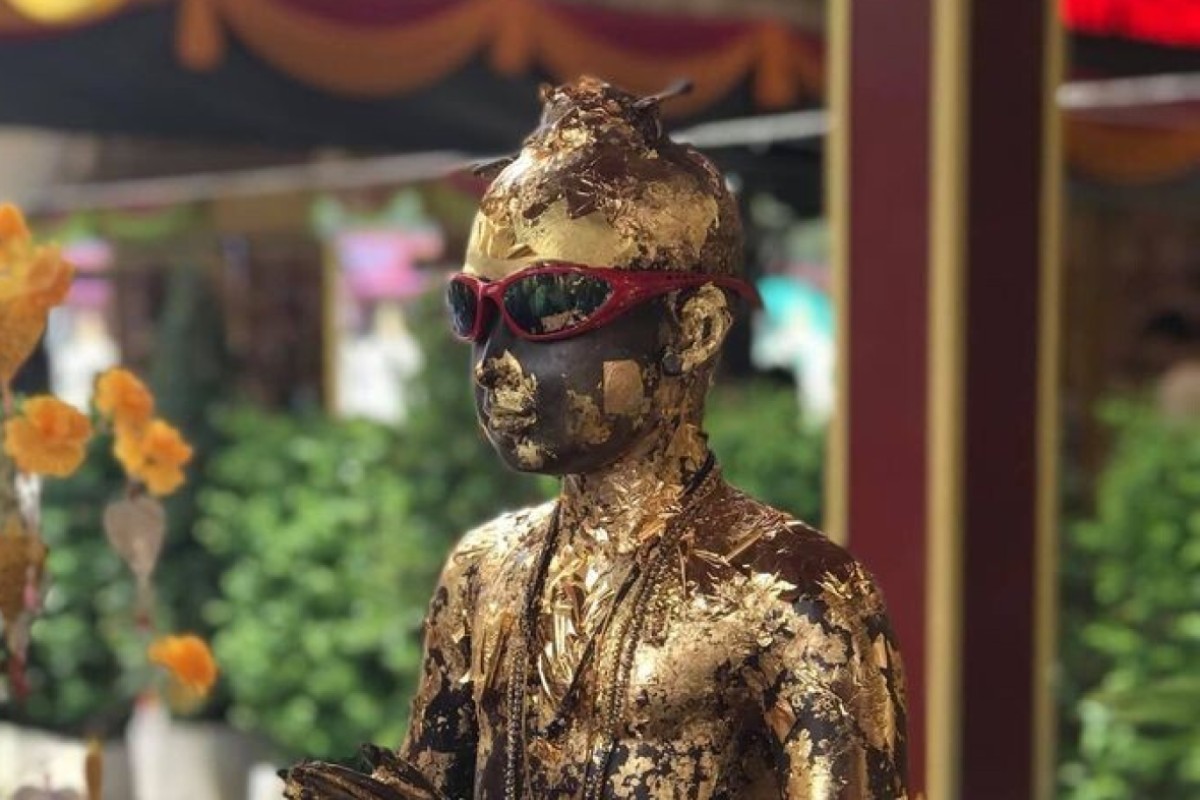
Believers pray to Ai Khai’s statue in the Wat Chedi temple. Photo: Facebook
Winning the lottery, finding a lost item, landing a promotion or finally closing a real estate deal: these are just some of the wishes that Thailand’s “Egg Boy” – a spirit said to reside in an ancient temple deep in the country’s south – has been asked to grant.
Ai Khai, as the spirit is known locally, has attracted almost 1 million visitors to his shrine at Wat Chedi temple in Nakhon Si Thammarat, 780km south of Bangkok, since Thailand emerged from its coronavirus lockdown in July, according to tourism authorities’ estimates.
The phenomenon coincides with a period of economic and political turmoil in Thailand. The government has been promoting domestic tourism to support an industry that is normally the backbone of the Thai economy but has been badly damaged by the pandemic.
Meanwhile, the capital has been rocked by student-led protests calling for political reform, including rewriting the constitution, holding new elections and curbing the influence of the kingdom’s monarchy.
Some analysts, as well as social media posters, have lamented the Egg Boy fad as a superstitious response to the unrest on both fronts.
Although the number of visitors to the shrine at Wat Chedi falls far short of the almost 40 million foreign tourists the country welcomed last year, the influx has turned the once-sleepy seaside town into a bustling tourist magnet, offering the industry as a whole hope of recovery.
Thailand has allowed no foreign visitors since it closed its borders to non-nationals in April but there are plans to allow a limited number of foreigners to return, starting in October.
Southeast Asia dodged worst of Covid-19, but economic devastation may last for years
30 Sep 2020
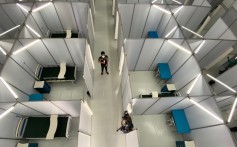
The government on Monday approved the entry of long-stay tourists and business travellers without a work permit, as well as holders of an Asia-Pacific Economic Cooperation Business Travel Card from low-risk countries, a move welcomed by tour operators and hotels across Thailand.
This might be good news for the once booming tourism hotspots of Phuket, Krabi, Pattaya and Chiang Mai, but Nakhon Si Thammarat seems content to rely on the legions of locals coming to see Egg Boy – who apparently excels at generating revenue as well as granting wishes.
“We expect that by the end of September, 800,000 visitors will have made the trip here, garnering over 800 million baht [US$25.2 million] in revenue.” said Pitsinee Tatniyom, provincial director with the Tourism Authority of Thailand. “There have been some 400,000 visitors already in September alone.”
Why Thais wear so many good luck charms, and why some cost so much
20 May 2019
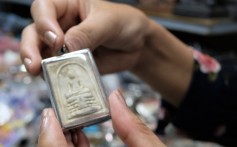
Nakhon Si Thammarat “is being lit up”, she said, thanks in large part to the intertwining of religion and tourism in what she referred to as “faith marketing”. Whereas the province’s airports used to accept about a dozen flights each day from elsewhere in the country, that number rose to 50 by the end of September.
With about 10,000 visitors every day during the week, rising to 25,000 per day at the weekends, Wat Chedi has recorded a surge in revenue from donations and the sale of items such as Egg Boy amulets and pieces of holy cloth. Hundreds of people often queue through the night to get their hands on the items before they sell out.
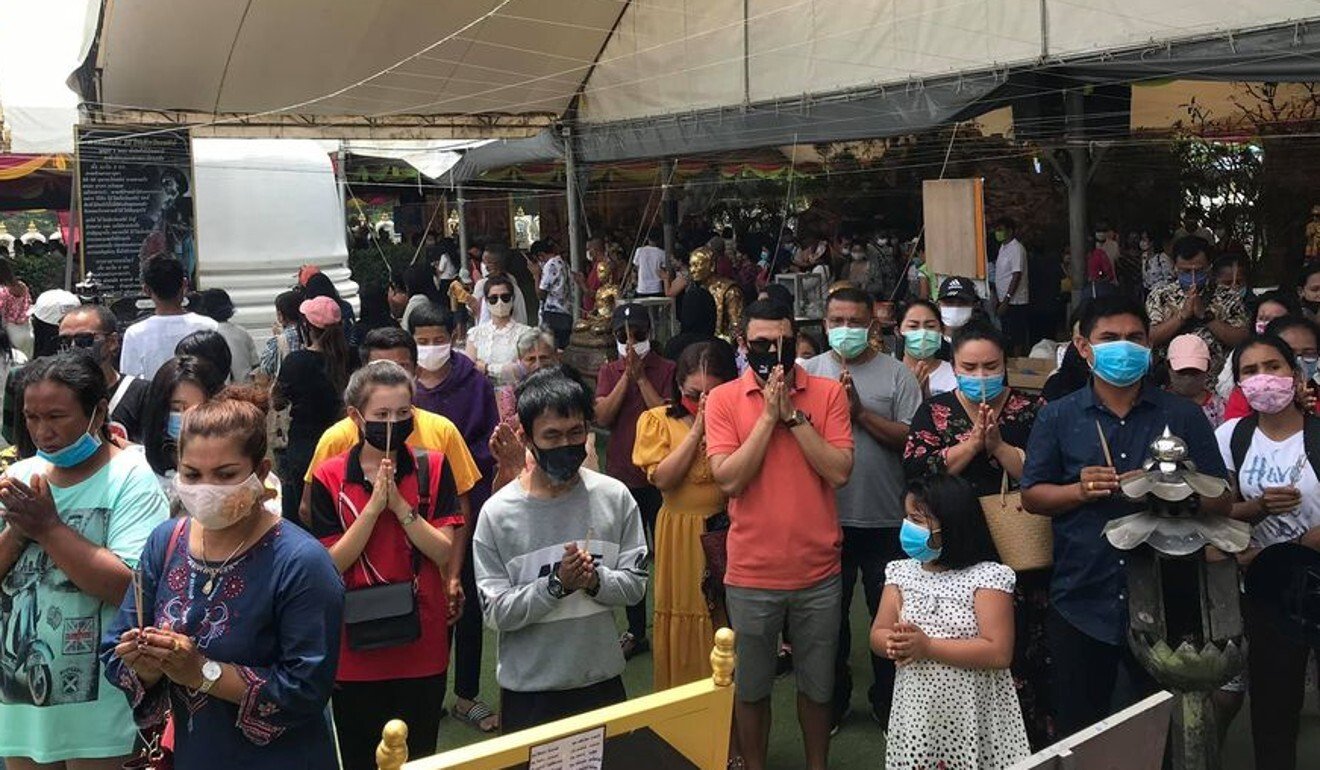
Criticisms of the Egg Boy shrine include the questionable morality of exploiting people’s faith to make money. Photo: Facebook
Believers pray to the spirit’s statue in the temple and if their wish is granted, they usually return to perform kae bon, a thanksgiving ceremony which often involves firecrackers and more donations.
Even those who do not visit the shrine sometimes have their wishes granted, according to Benjapop Benjathammatorn, owner of the nearby Sichon Cabana beach resort.
“One of my customers lost a necklace at the beach and after praying to Egg Boy for help, the necklace was found the next morning,” he said.
The local tourism industry is thriving, with many businesses welcoming repeat customers as well as those who have been urged to visit by friends or relatives.
At Thai protests, LGBT activists strengthen calls for marriage equality
21 Sep 2020
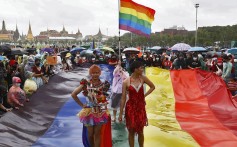
Leng Khanom, who works at an Egg Boy amulet shop in Nakhon Si Thammarat, said the trinkets can fetch as much as 100,000 baht (US$3,155) depending when they were made – the oldest, dating back to 1983, are usually the most expensive.
According to local legend, the temple at Wat Chedi is hundreds of years old but it had been reduced to a pile of ruins until it was rebuilt about 60 years ago.
Egg Boy’s reputation has now grown to the point where a statue has been erected in other provinces and his amulets are also reproduced elsewhere, prompting the abbot of Wat Chedi in September to obtain the copyright for the various items the temple produces and sells.
One Twitter user asked: “Registering for Ai Khai copyrights means the spirit is completely commercialised. Shouldn’t the temple be scrutinised?”
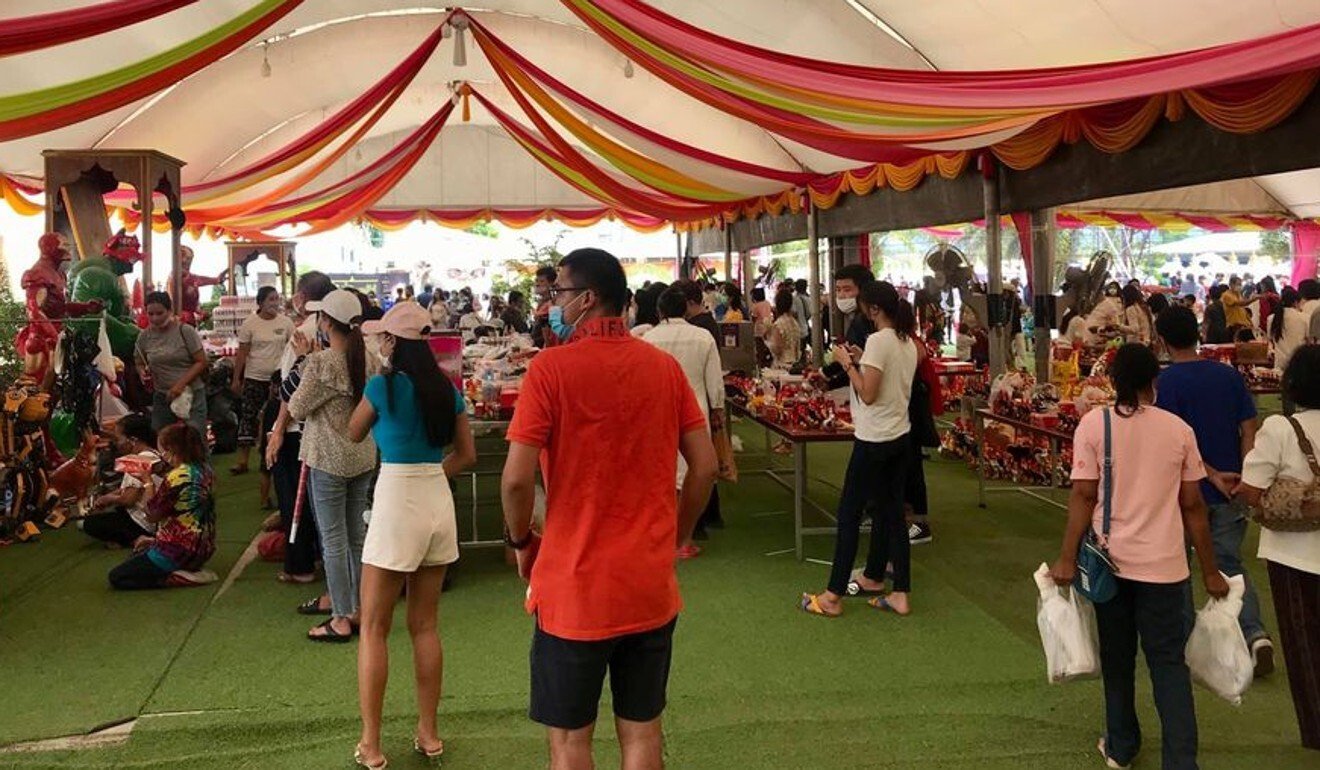
Wat Chedi welcomes 10,000 visitors every day during the week and 25,000 per day on the weekends. Photo: Facebook
Other criticisms of the Egg Boy shrine include the questionable morality of exploiting people’s faith to make money, and the dismissal of the craze as mere superstition.
“#AiKhai says how desperate the people in this country are with the daily grind that they have to ask for money from leaves and trees,” another Twitter user wrote. “Is politics not involved?”
Phra Maha Paiwan Warawanno, a monk and social critic, said the Egg Boy fad will eventually fade. “This sort of popularity is superficial as we have seen from the previous phenomena in Thailand,” he said, pointing to other once fashionable items such as Jatukham Rammathep amulets, believed to provide protection and good fortune, or the Luk Thep baby dolls believed to be possessed by auspicious spirits.
Thai student protesters gain upper hand as Prayuth reels from Covid-19, tourism crash
25 Sep 2020

“It is human nature to want to have hope and holy items are an accessible source of hope. But in the long run, the roles of temples can be distorted. Temples should provide people with intellect and an ability to see things with reason.”
Pipad Krajaejun, a history lecturer at Thammasat University, noted that Egg Boy’s fame had coincided with the coronavirus pandemic “which caused the economy to crash and people to lose hope”.
According to Pipad, Ai Khai’s popularity reflects a society where wealth has grown increasingly concentrated among Thailand’s elite, curtailing the prospects of regular Thais.
“Thailand has to remodel its political and economic structure to allow people to acquire well-being and opportunity in order to be less attached to praying for wealth and materialism,” he said.
No comments:
Post a Comment